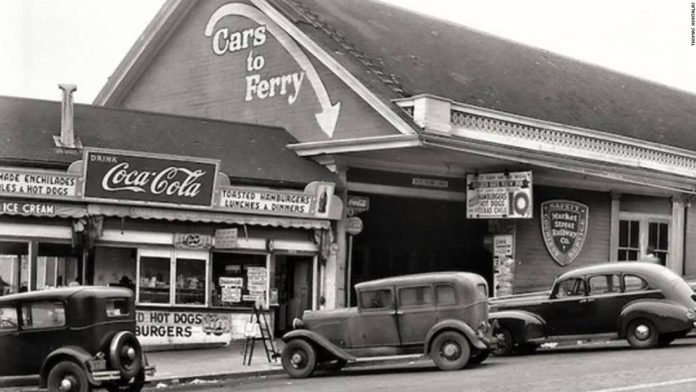“I’m trying to process not having this business I’ve been working at my entire life. I started working there when I was 10 years old,” Hontalas told CNN. “I kind of feel lost right now.”
Louis’ Café, which sat on a San Francisco cliff overlooking Ocean Beach, was started by his grandfather at the end of the Great Depression. Through World War II, devastating fires and threats of demolition, Louis’ held his grandfather’s name and stayed in the family through three generations. Until the Covid-19 pandemic broke out.
Already, several restaurants across the US that weathered the economic chaos of the Great Depression to become fixtures in their communities have not been able to withstand coronavirus.
‘I never encountered anything like this’
Hontalas’ grandfather, Louis, brought his 19-year-old wife on a ship from Greece to the US in 1928 — right on the heels of the Great Depression. Their family grew quickly, and they did everything they could to make it through their first years.
By the end of it, they had Louis’.
But it was not smooth sailing from there. World War II soon followed and brought rationing. In 1949, the building adjacent caught fire, damaging Louis’ as well. Then in the 1960’s, the building was bought, and Hontalas said the new landlord threatened to tear it down to build condominiums. When a fire broke out in the Sutro Bath’s nearby in 1966, Hontalas said it was a “miracle” Louis’ didn’t burn down.
Through the threats of destruction, Hontalas’ grandfather, his father and then he and his brother kept Louis’ afloat with their great view, their good food, their fair prices and their people, he said.
One of which was Rachel Lelchuk, a Russian woman who wore a flower in her hair and could sell a piece of pie for breakfast, Hontalas said. She started working at Louis’ in 1946 and stayed for about 55 years. Customers would wait for a table just to make it into her section, he said.
And then coronavirus hit.
“On March 16 — it was a Monday — we opened our doors for business and there was no one around,” Hontalas said. “We closed that day around noon.”
Later that day, California Gov. Gavin Newsom announced that restaurants would not be allowed to remain open. Even at the time, Hontalas said he was suspicious that this wouldn’t be going away any time soon.
“I never encountered anything like this and neither has anyone else,” he said.
From insurance to rent to utilities, the bills piled up and revenue had disappeared indefinitely. Hontalas sat down to go over the numbers as his brother and business partner dealt with serious health concerns, and he realized they couldn’t keep it afloat.
Hontalas said he thought he was just closing “a little restaurant,” but then the announcement was followed by an outpouring of love. Patrons shared stories of their last meal with their grandmother there, begging as children to be taken to eat there, getting their first job there and ultimately, many said, being treated like family when they walked in the door.
‘We depended on the full dining room’
Ritz Barbecue in Allentown, Pennsylvania, shut down the day before the governor’s order, and thought they would open again.
“Initially it was supposed to be two weeks, and it was like ‘yeah we can deal with that.’ And then a month and ‘yeah, we can deal with that.’ And then three months it was ‘I’m not sure how much longer this can go,'” Grace Stinner said.
She and her husband Jeff bought the restaurant in 1981, but its origins date back to a stand at the Allentown fair in 1927. It never closed except to rebuild after a fire in 1998, she said.
That morning, Stinner heard, the owner of a construction company got a call from his sister crying that the Ritz burned down. He promised her he would be the one to rebuild it.
But when coronavirus struck, it was hard to imagine building it up for a second time.
“We depended on the full dining room and the line out the door to pay the bills,” Stinner said.
The Stinners could have done the work themselves to stay afloat, but they are both in their mid-60’s with health issues and questioned whether they could take the risk.
When they decided to close shop, people wanted to buy pieces — from the signs to the potted plants — to remember the place where Stinner said something was always going on.
It could be the 1950’s car parties in the parking lots, or people coming in to play instruments around Christmas time. On one slow and rainy night, it was two bus loads of kids rushing in for ice cream cones.
A stage for Janis Joplin
Threadgill’s went from a bootlegger’s service station in 1933 to a restaurant with more than 30 vegetables on the menu overrun with the children of its employees.
Though Kenneth Threadgill didn’t have as much of an interest in running the business as he did in country music, said Eddie Wilson, it became successful as the place traveling musicians would grab a beer after their Austin gigs.
Wilson, who now owns Threadgill’s with his wife Sandra, would go when he was young to try to get close with Threadgill’s daughter who he had a crush on. He would also hear Janis Joplin perform.
“When he had the likes of Janis there, he had people belt buckle to buttock in there,” Wilson said. “It was so crowded that you couldn’t wiggle.”
The Wilsons took over the Threadgill’s he had grown up around and made it their own. Eddie Wilson didn’t have training to run it, but he said he emulated his mother’s nursery school.
Children of what grew to be their 135 employees were always around, he said. Some of those employees were with them for 35 years.
It was those employees that kept Threadgill’s open for as long as it was, and they were also the reason they decided to shut their doors, Sandra Wilson said.
When the government told them to close, the Wilsons said, they sat down and helped their staff apply for unemployment.
“It was a really sad, horrible experience actually,” Sandra Wilson said.
While their trip with Threadgill’s has come to an end, they both hope someone else will pick it up and keep it going.
“If somebody else wanted to do it, I would consult with cheeseburgers and beer,” Eddie Wilson said.
Source : CNN














